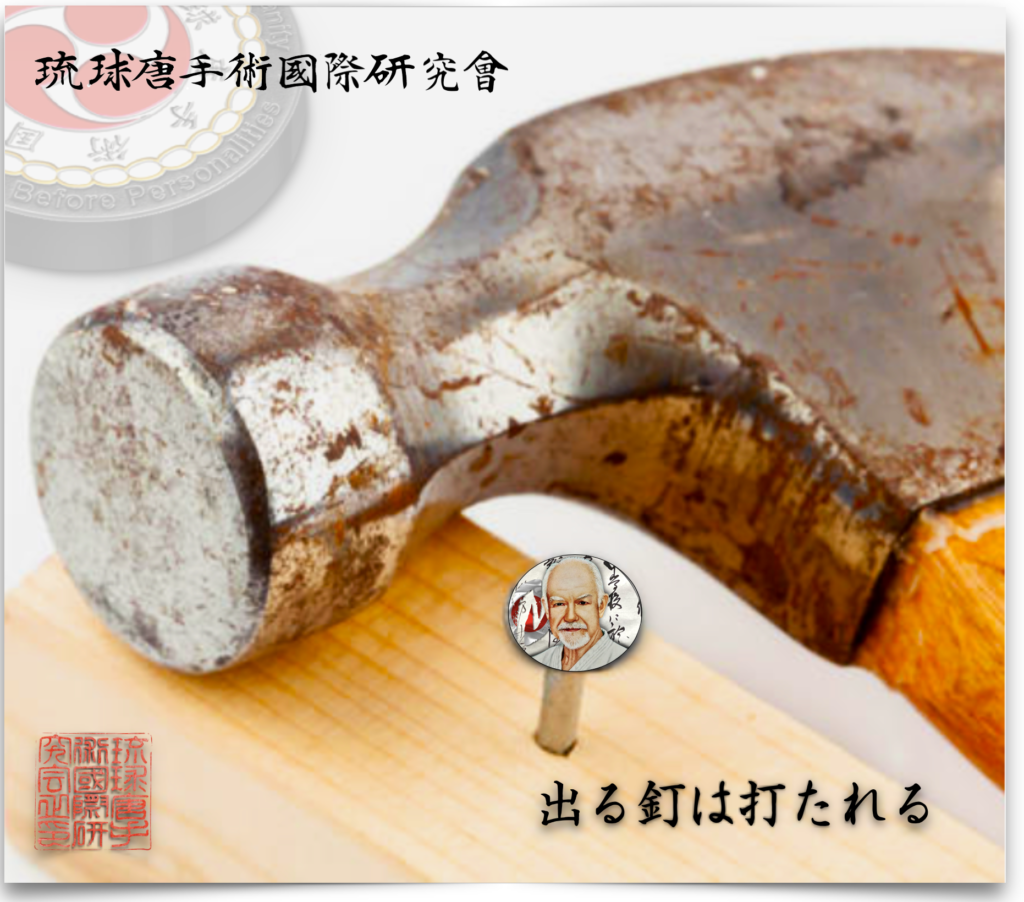Creativity vs Conformity
By Patrick McCarthy

There is an interesting proverb about people who are different or conspicuous and get harshly criticized or sanctioned by the traditionally conservative;
Deru Kugi wa Utareru [出る釘は打たれる] means something like, “A Protruding Nail Gets Hammered Down.”
This proverb addresses the issue of not conforming in Japanese society with cultural norms, traits, beliefs, and accepted values of harmony. In Japan [most] everyone behaves and lives as is expected of them so as to keep the harmony, peace and uniformity in their society. A social phenomenon built into their culture, which serves to help govern expected behaviors, is known as, “Tatemae & Honne” [建前と本音]; It contrasts a person’s expected behavior [Tatemae] with their true feelings and inner desires [Honne]. A cultural mechanism designed to help perpetuate this mindset is known as the Senpai [先輩, “senior”) ~ Kōhai [後輩, “junior”] System; It represents an informal hierarchical interpersonal relationship found in various walks of life; e.g. Education, Business, Industry, Politics, Military, Law Enforcement [and related emergency services] … and, the fighting arts.
Creativity is acceptable as long as it is not “too” different and does not stand out nor create distraction. For the most part, 21st century Japan, as a whole, is much more tolerant of the classical issue of individualism, but it is not widespread, and much more noticeable with ultra conservative traditions. If the tradition dictates you should behave in one way, but you behave in another, then most likely trouble awaits you. It’s not saying that breaking with tradition is necessarily a bad thing but, if you challenge the status quo, then be prepared for the system to come down on you like a hammer.
As a rule, people within culturally traditional groups, are expected to conform to such accepted rules, rituals and protocols, even at the cost of individuality and personal freedom. If/when they dare to stick out [i.e. challenge the status quo], the force of the “hammer” will come down on them [as it has with me]. This is almost always more about toeing the line and not challenging the status quo than it is about actual creativity. Japan’s [i.e. Okinawa] spiritual foundation is steeped in Confucian thought; Confucian-based ancestor worship [filial piety] revere its elders; Elders are regarded as patriarchs and original source[s] of authority. No where is this more evident than within the traditional fighting arts! Thus, and by extension, this mindset does not encourage critical thinking [i.e. the questioning of authority]; In fact, such a thing is very often considered highly disrespectful.
When comparing traditional Eastern culture to the West, a different perception of power contrasts the classical hierarchical structure with a more egalitarian individualism; i.e. Group Harmony vs Individualism. In the West, we tend to place great value upon independence, and champion individualism; e.g., Bruce Lee spearheaded the movement about gleaning more efficiency from reinterpreting the common principles of a pre-existing structure [or practice], especially if/when it has become dysfunctional; My historical study into the practices of pioneers such as Kyan Chōtoku and Motobu Chōki revealed striking similarities.
[See ]
My Take on Tradition?
Matsuo Basho [松尾芭蕉, 1644-1694] aptly described tradition when he wrote, “Seek not to [blindly] follow in the footsteps of the men of old but rather continue to seek out what they sought.” This timeless concept says so much about keeping tradition alive, rather than blindly adhering to “exactly how the master did it 75 years ago!” Gustav Mahler [1860-1911] echoed the exact same sentiment, when he wrote, “Tradition is not the worship of ashes, but the preservation of fire.” The IRKRS believes deeply in keeping tradition a living experience for the community it serves through perpetuating the spirit of historical and scientific exploration; By continually seeking out to better understand and improve what the Okinawan pioneers originally sought.” This is tradition, and this is the way!
So, if you happen to be a protruding nail [like me]; beware of the “hammer,” and all those who wield it! I guarantee that some people [not all] will be offended by an, “out-of-the-box mindset” and it will most likely cause them to tell other people to, “Stay away from you because, YOU ARE DANGEROUS!”
* Note: I have been speaking about this issue, since the late 1980s, during the time I first resided in Japan [and started to question “authority“]; Here’s an interview with Joe Swift [entitled, Kurofune … “The Black Ship”] based upon a series of interviews [by the same name] I did with Scotland’s Colin Whitehead, for the British magazine, “Fighting Arts International; aka FAI http://www.koryu-uchinadi.org/Karatedo_Kurofune_Interview.pdf Original interviews: https://irkrs.blogspot.com/2017/12/karate-do-kurofune-black-ship-of-karate.html?view=flipcard
